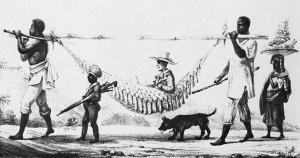 Meet Philemon: Slave Owner
Meet Philemon: Slave Owner
What a delight to get to read Philemon. When left to our own devices, how many of us pick up the Bible one morning and say, “Hmmmm. I think I’ll read the book of Philemon today!”?
But I’m glad to be able to read it this morning and that our lectionary plan to read through the entire Bible has led us to Philemon today. In this one-chapter book, we see a picture of the radical command to love that Jesus Christ places upon all of His disciples.
The central issue of Paul’s letter to Philemon is that of love, but love that must be acted out in a very specific, real-life, circumstance. The circumstance is that Onesimus, who is a slave belonging to Philemon, has run away from Philemon.
The contrast in the relationship of Philemon to Onesimus as Christians to their relationship if they were still pagans is a picture of the difference between life in the Kingdom of God and life in the kingdom of Man, and it is the difference between a world ruled by love and one ruled by self.
In the Roman world, a slave who ran away could face severe consequences and potentially even the death penalty. The slave could be seen as a member of the family or as just a piece of property. If the owner were concerned that the slave was rebellious, he could have him punished or even put to death. At a minimum, he would expect the prompt return of his slave for him to deal with as he saw fit.
But in the Kingdom of God, Paul strongly urges Philemon to act in love. He begins by appealing to the love that he already knows Philemon has shown. In verse 4, Paul has heard of Philemon’s love and faith toward both Jesus Christ and all the saints. Philemon’s love has even extended to hosting a church in his house (verse 2). Paul has great joy and consolation in Philemon’s love because the hearts of the saints have been refreshed by him (verse 7).
As an apostle, Paul could demand that Philemon do what is loving. But he does not want to compel Philemon, knowing that love must be voluntary (verse 14). But instead, for love’s sake (verse 9), he appeals to Philemon on the basis of love to do what is loving to Onesimus. In this case, this meant receiving Onesimus, the unprofitable and runaway slave. More than this, it meant receiving him now as a beloved brother in Christ, because he became Paul’s “son,” that is, born again, under Paul’s ministry (verse 10). Philemon had every right to receive Onesimus back as a slave, and one under discipline. But Paul exhorts Philemon to receive him with love as a brother in Christ now.
Of course, Paul’s exhortation, to one who loves God, is even more powerful than compulsion because Paul himself is in prison when he writes to Philemon about slavery and love. Exhorting on the basis of the love of God, the love of Paul, and the love Philemon himself has demonstrated is the most powerful persuader to one who desires to love.
To do what Paul is asking would require a tremendous amount of love on the part of Philemon: love for God, love for Paul, and love for his new brother in Christ – Onesimus. While giving up a valuable property in human terms, Philemon is gaining a brother in Christ, and one who is likely to work more faithfully out of love than he had ever worked before when he was a slave of compulsion. Paul is so convinced that Philemon will act in love that he is convinced that he will do even more than Paul urges (verse 21).
But Paul urges Philemon therefore to receive Onesimus back no longer as a slave and yet more than a slave. And this leads to the love that is required of Onesimus. Though Paul’s letter is to Philemon, Christian love is also required of Onesimus. Onesimus must humbly return to Philemon and make restitution for all the wrong he has done (verse 18). Though he might potentially return as a slave in bondage, Paul wants him to return as a bondservant of Jesus Christ – and such bondservants make the best servants of all. When he was a slave, apparently he was not a very profitable one. But now that he is a slave of God, he promises to be a much more profitable servant to Philemon (verse 11).
Onesimus is now truly profitable, because he is first the slave of God. Love will make him profitable, whose name (“Onesimus”) means “profitable” (Paul seems to be playing on the meaning of Onesimus’ name in verse 11).
Paul is confident that Onesimus will return and act in love toward Philemon because he had ministered so faithfully to Paul himself (12.) And this leads to the love of the third person involved: Paul himself. It is because of his love for both Philemon and Onesimus that Paul is acting as a minister of reconciliation. Paul knows that in the church, there is neither slave nor free, and yet all are servants of one another. This is not an abstraction with Paul but must be lived out in real lives.
But Paul’s love is not merely in getting others to love: his own teaching requires him to give up himself for the good of Philemon. Paul wanted to keep Onesimus for himself – not as a slave but as a willing servant of the Lord. In fact, Paul calls him “my own heart”! Paul’s love for Onesimus is great, but his love for Philemon must be just as great because he willingly gives up Onesimus for the good of Philemon. And that is the definition of love: giving up your own things for the good of others. Paul’s love is so great that he is even willing to pay what Onesimus owes Philemon, even though it is not technically Paul’s problem or debt.
We don’t know exactly how things turned out between Philemon and Onesimus. Onesimus is mentioned in Colossians 4:9 as a faithful and beloved brother, and church tradition says that he was martyred. There is even a possibility (how likely we do not know) that he is the same Onesimus who is mentioned by St. Ignatius as an early bishop.
What we can say with confidence is that being a slave to self is true bondage but being a slave to God is not only true freedom but also the only means to true love.
If Philemon and Onesimus and Paul can love in such a difficult circumstance, in what ways is God calling each of you to love more as these three men loved?
Prayer: Father, who by Your love sent Your Son into the world to save sinners, grant me Your love today. So fill my heart with love of You that I might be enslaved to Your holy will and Person. Give me the grace to be able to give up my own things for the good of others that in loving neighbor I might better love You.
Point for meditation:
- Spend some time imagining the historical situation that Philemon, Onesimus, or Paul was in. What did that person have to give up? Are you willing to give up similar things for the good of someone else?
- Find one relationship in your life where God is calling you to give up your things for the good of others. Remember to see that what you do to this person is what you are doing to Jesus Christ Himself. Take concrete action in showing love toward the person God has put in your mind.
Resolution: I resolve to meditate today on the meaning of love as portrayed in the story of Philemon, Onesimus, and Paul.
Slaves and Slaveowner – U.S. Public Domain









